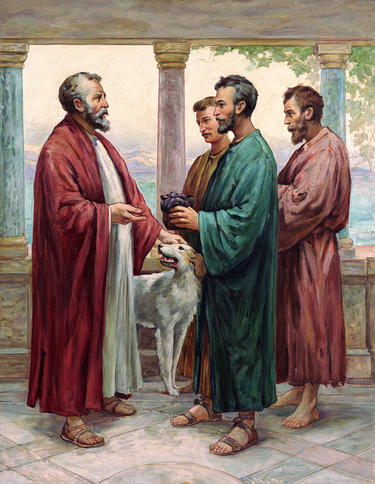 |
| image credit: ucg.org |
Master, I knew you were a demanding person, harvesting where you did not plant and gathering where you did not scatter . . .Now, the Master obviously represents God, and God is all-good, so we would think that He would naturally pass by these claims that He was stealing, but the Master agrees with the servant:
So you knew that I harvest where I did not plant and gather where I did not scatter?. . . and what do these things have to do with the servant not increasing the money he was given? The Master clearly links them as He continued:
Should you not then have put my money in the bank so that I could have got it back with interest on my return?In wondering about this, some ideas came to me.
We clearly recognize that God isn't a divine investment banker, concerned with worldly riches. After all, He already owns all the money in the world, we just get to use it. The talents, then, as most people easily gather, refer to abilities or opportunities that we are given. These gifts are given to us so that, by putting them to use ("trading with them"), we might draw closer to God and draw others closer to God, ultimately to be happy with Him forever in Heaven.
So what to make of the "gathering where He had not scattered"? Is God just some greedy farmer?
What if Jesus was implying that "where He scattered" was the group of souls of those who would be in His Church (or even those who have been properly evangelized)? If that is the case, we could posit that saying "He gathers where He did not scatter" could refer to the idea that God even gathers people to Himself people who are not visibly part of His Church. This is nothing new. The Catholic Church has always taught that people who don't know God are still drawn by God to Himself via truth, goodness, beauty, etc., and it is even possible for them to be saved. (See Acts 10:35, CCC 843, 847).
If this interpretation can be plausible so far, let's consider why the servant was so wicked and lazy for not "making money." While people outside the visible union of the Church can be saved, it would be much easier for them if they were Catholics (CCC 848-856). Why? . . . because Catholics have two very distinct advantages in the pursuit of a relationship with God: the fullness of the Truth, and the Sacraments.
- Knowing the fullness of what Jesus revealed and has been handed on by the Apostles and their successors about God Himself and how we ought to live provides us with a "detailed map" of how to follow God. Every other person has his own map, it's just not as complete (lacking the fulness of truth) or it may have inaccuracies. It is still possible to draw closer to God, just not as easy. The completeness of any other such map would obviously vary depending on the closeness of that person's knowledge to the Deposit of Faith given to, and handed on by, the Catholic Church.
- The Sacraments give us God's extra helps (graces) on the journey. Baptism wipes away every sin up to that point, makes us God's children, gives us a participation in His Life (Sanctifying Grace), etc. Confirmation strengthens Baptism's effects on us, enabling us to mature in that relationship. Holy Communion is God Himself, and as we consume Him our bodies assimilate Him and He assimilates us into His Body (the Church). Reconciliation forgives sins that we commit after Baptism. Marriage helps us to live a loving, stable family life, and raise more souls to go to Heaven. Holy Orders gives us more men to teach us, govern us, and give us the Sacraments. Anointing of the Sick helps us to remain faithful to God when we are near death, so that we may not despair in the "hour of our death." These graces help us to love more and more deeply both God and neighbor. Effectively, the Sacraments get us on the right path on the "map," bring us back to the path when we stray, help us to see the right path, and continue on it, even when it's tough.
 |
| Image Credit: 1.bp.blogspot.com |
We, too, are given our own talents. Every single one of us has the ability to draw closer to God and to draw others closer to God. We're all called to help scatter the seed of God's Truth (see Lk 8:5-15), increasing the Master's area of scattering and planting, so that as many souls as possible end up loving God deeply and being happy with Him in eternity. This is both a right and a duty. We get to help draw people closer to God, and must help draw people closer to God--for their sake and our own. Of course, the more we love God, the more we will desire to help others know and love Him more, so this duty is gladly accepted. Let us, then cultivate that relationship, study our road maps, and trade for as many talents as we can while we still have time to trade.
Trying to trade my talents well,
Casey